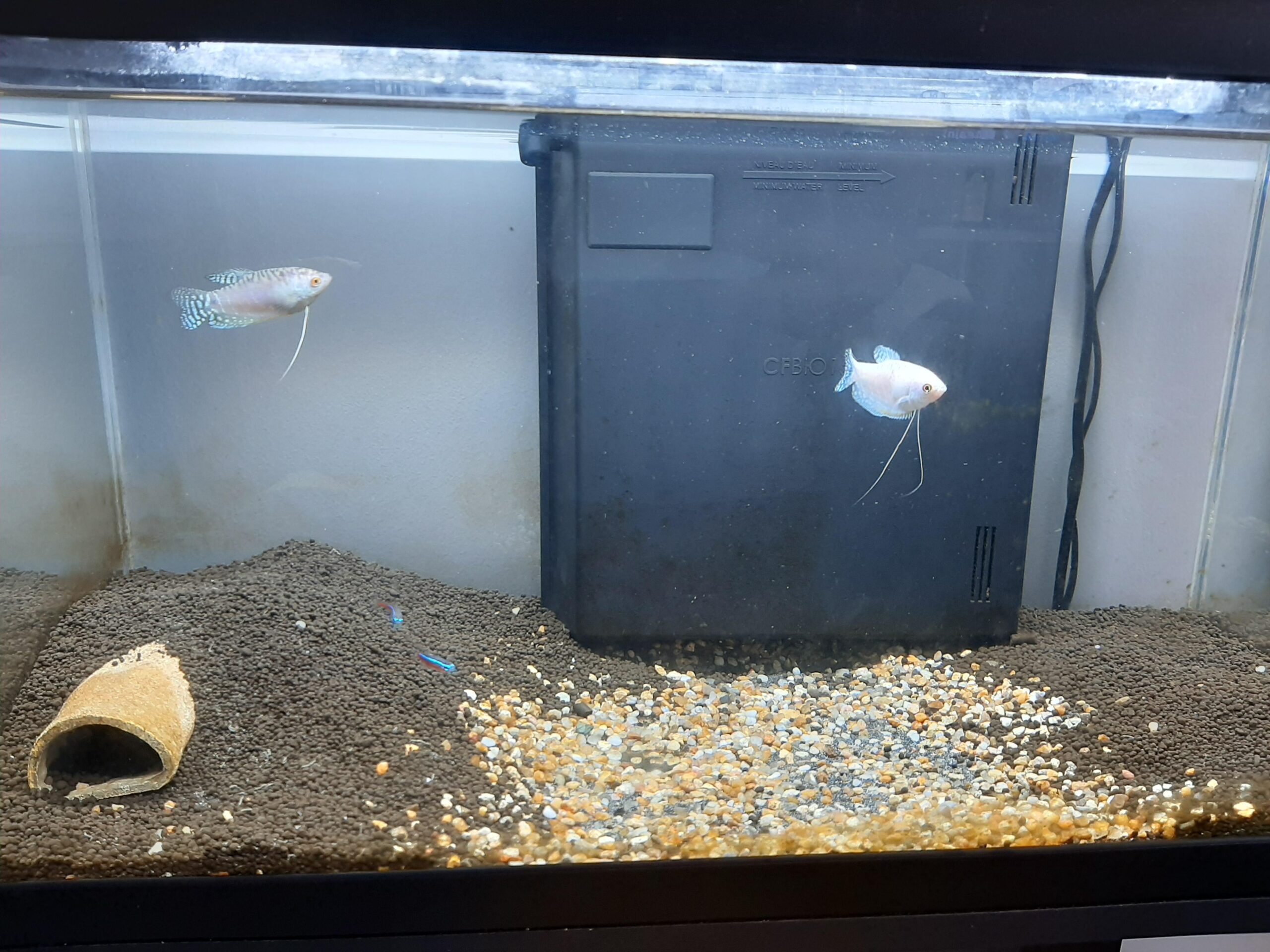Can a Fish Disappear from a Tank?

Yes, a fish can disappear from a tank due to various reasons such as jumping out or getting stuck in decorations. Keeping fish as pets is a popular hobby, but sometimes a puzzling and concerning question arises: can a fish disappear from a tank?
While we might expect fish to remain safely confined within their aquatic abode, there are instances when they manage to escape.
Understanding why a fish goes missing is crucial for ensuring their well-being and preventing future disappearances.
This article explores the reasons behind a fish’s sudden vanishing act, shedding light on the various possibilities that can lead to an empty tank.
By familiarizing ourselves with these factors, we can take appropriate measures to maintain a safe and secure environment for our aquatic companions.

Credit: www.youtube.com
Why Is My Fish Missing?
Fish disappearing from a tank can be worrisome. There are several possible reasons for this occurrence.
Firstly, fish have natural behaviors like hiding or exploring unseen areas within the tank.
Secondly, environmental factors such as water quality or temperature fluctuations may stress the fish, leading them to hide.
Additionally, inadequate tank conditions such as poor filtration or crowding can result in fish becoming stressed and seeking refuge in hard-to-detect areas.
To prevent such disappearances, ensure a suitable tank setup with proper hiding places, optimum water parameters, and adequate space for each fish.
Observing natural behaviors and maintaining a healthy environment can help minimize instances of missing fish.
Regular tank maintenance, creating a stress-free environment, and paying attention to any signs of illness are essential for the well-being of your fish.
Signs Of A Missing Fish
Observing the tank closely is crucial in identifying signs of a missing fish. Look around for any hiding spots or decorations where the fish might be hiding.
It’s also important to pay attention to the behavior of the other tankmates.
If they seem unusually territorial or aggressive, it may indicate that something has happened to the missing fish.
Keep in mind that fish are excellent at camouflaging themselves, so a thorough inspection is necessary.
Additionally, inquire with other people who have access to the tank if they have noticed anything unusual.
It’s important to act quickly to prevent any harm to the missing fish and ensure the overall health of the tank.
Preventing Fish Disappearance
A fish can indeed disappear from a tank if certain precautions are not taken. One way to prevent this is by securing the tank properly.
This can be done by ensuring that the tank is of adequate size, providing enough swimming space for the fish.
Additionally, offering hiding spots and the inclusion of plants in the tank can also help to prevent fish disappearance.
These hiding spots and plants create a sense of security for the fish, making them less likely to wander off or go missing.
By following these guidelines, fish owners can ensure the safety and well-being of their aquatic pets.
Dealing With A Disappeared Fish
Fish disappearing from a tank can be a cause for concern. Conducting a thorough search is crucial. Check for any hiding spots, and carefully examine filters and equipment.
Additionally, assess the water quality and parameters to ensure a healthy environment for the fish.
Keep an eye out for any unusual behavior or signs of distress. Taking these steps can help determine the fate of the missing fish and address any underlying issues.
Remember, a proactive approach is essential in maintaining the well-being of your fish.
Predatory Tankmates And Aggression
Choosing aggressive tankmates and monitoring their behavior is crucial to prevent a fish from disappearing in a tank. Predatory fish and their aggression pose a risk to other tank inhabitants.
By carefully selecting tankmates, you can minimize conflicts. It is vital to observe their behavior regularly, looking out for any signs of aggression.
If you notice aggressive or predatory traits, it’s best to separate those fish to protect others in the tank.
Maintaining a harmonious and peaceful tank environment is necessary for the well-being and safety of all the fish.
Ensuring compatibility among tankmates and taking precautions against aggressive behavior will reduce the chances of a fish disappearing from the tank.
Escaping From The Tank
Fish disappearing from a tank can be a perplexing situation. Identifying possible escape routes is crucial in preventing such incidents.
Securing lids and covers can help keep the fish contained within the tank. Limiting tank access by blocking any potential escape paths is also essential.
Taking these precautions ensures the fish stay safely in their designated habitat.
By maintaining a secure environment, you can prevent the fish from disappearing and provide them with a comfortable and protected space.
Disease And Illness
Fish disappearing from a tank can be a sign of disease or illness. Recognizing symptoms, such as changes in behavior or physical appearance, is crucial.
It is important to quarantine sick fish to prevent the spread of infection to other tank inhabitants.
Seeking professional assistance is advisable to accurately diagnose and treat the fish. Getting expert help can ensure the health and well-being of both the sick fish and the overall aquarium ecosystem.
Being attentive to these indicators and taking appropriate action promptly can help prevent further complications and loss of fish in the tank.
Behavioral Changes And Stress
Fish disappearing from a tank can be caused by behavioral changes and stress. Signs of stress include changes in appetite, color, and swimming patterns.
To prevent this, offering proper tank enrichment is crucial. Adding plants, hiding spots, and toys can promote a more stimulating environment for the fish.
Additionally, maintaining a calm and peaceful atmosphere is essential. Avoid loud noises, sudden movements, and overcrowding.
A well-maintained tank with appropriate water conditions and regular cleaning can also reduce stress levels.
By being attentive to the needs of your fish and providing a stress-free environment, you can minimize the likelihood of them disappearing from the tank.
Conclusion: Creating A Safe And Healthy Aquarium
Proper maintenance plays a vital role in ensuring a safe and healthy aquarium environment. Regular observation and care of the tank are essential to prevent fish from disappearing or facing any harm.
Monitoring the water parameters, such as temperature and pH levels, helps maintain optimal conditions for the fish.
Additionally, regular cleaning of the tank, including removing debris and performing water changes, promotes fish health and well-being.
Over time, waste and toxins can accumulate in the tank, which can be harmful to the fish.
By staying attentive to the needs of the aquarium and its inhabitants, you can create a thriving ecosystem that ensures the fish’s safety and allows them to thrive.
So, it’s important to prioritize proper maintenance to keep your fish happy and healthy.
Frequently Asked Questions:
Why Might Fish Disappear From A Tank?
Fish may disappear from a tank due to various reasons. Lack of oxygen or water quality issues, including high ammonia or nitrate levels, can stress and harm fish.
Overcrowding can also lead to stress and aggressive behavior, resulting in fish disappearing.
Inadequate feeding or inappropriate diet can weaken fish, making them susceptible to disease and eventual disappearance.
Predatory tankmates can eat smaller fish, causing their disappearance. Additionally, fish might jump out of the tank if there is no proper lid or cover.
Escaping through small openings or gaps is also a possibility. Therefore, it is vital to maintain the tank’s conditions, offer proper nutrition, avoid overcrowding, and provide appropriate tank covers to prevent fish from disappearing.
Always monitor the aquarium and address any issues promptly to ensure the well-being and longevity of the fish.
What To Do If You Can’t Find Your Fish?
If you can’t find your fish, there are a few steps you can take. First, check the surrounding area, including any hiding spots or decorations in the tank.
Look for any signs of distress, such as unusual behavior or physical injuries.
If your fish is still missing, carefully inspect the tank to ensure there are no holes or gaps where it could have escaped.
If you still have no luck, consider the possibility that your fish may have died, in which case you should look for any signs of a deceased fish and remove it from the tank.
Finally, if all else fails, consider seeking advice from a professional or experienced fish keeper who may be able to assist you further. Remember, prompt action is important to ensure the safety and well-being of your fish.
What Happens If You Can’t Find A Dead Fish In Your Tank?
In case a dead fish cannot be found in your tank, it is important to take immediate action to prevent any potential harm to other fish.
First, carefully observe the behavior of the other fish in the tank. If you notice any signs of distress or illness, it is advisable to isolate them and monitor their condition closely.
Next, perform a thorough tank cleaning, including checking the filter system and removing any potential hiding places where the dead fish may be located.
Additionally, check for any ammonia or nitrate spikes in the water, as these can indicate a decomposing fish.
Finally, maintain regular water tests and ensure proper feeding and care for the remaining fish.
If the situation persists or worsens, seeking assistance from a professional fishkeeper or veterinarian is recommended.
How Long Can My Fish Be Out Of The Tank?
Fish can stay out of the tank for a maximum of 15-20 minutes. Beyond this duration, fish may experience stress and oxygen deprivation, which can be harmful to their health.
It is crucial to minimize the time fish spend outside the tank to ensure their well-being.
Keep in mind that different fish species have varying levels of tolerance to being out of water, so it’s essential to research the specific needs of your fish.
Ensure a smooth transition during maintenance or transporting by using a net or cup to safely move them.
Always handle fish with clean hands to avoid introducing harmful substances into their environment.
Additionally, wetting your hands before handling them helps protect their delicate scales and skin.
Remember, a brief duration outside the tank is key to maintaining a healthy and happy fish.
